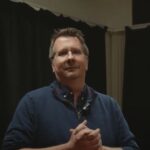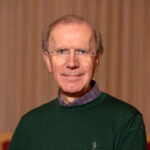Music Technology
Watch this video to hear from Music Technology Teacher Adrian Horn and see behind-the-scene!
Music Technology is a fast-growing are within the School and we are fortunate to be have some first-rate studio facilities for our students including:
• Two purpose-built Recording Studios with separate recording and control rooms. Both feature a Logic Pro X based DAW system with a Slate Raven Core Station Dual touch screen control surface and Apogee Ensemble audio interfaces.
• A third Logic Pro X based studio, acts as an additional mix suite / DI / overdub room.
• A suite of Apple computers running Logic Pro X DAW software.
The A Level Music Technology course guides students through the theory, analysis, and evaluation of audio production techniques from the early 1900s to modern day. You will also develop practical skills involving the production of audio recordings and the creation of music using sequencing techniques, audio manipulation, creative audio effects and synthesis.
Some of the areas covered include:
Understanding Sound
• Frequency and harmonics, and the mathematics behind them
• Amplitude and volume
• How sound waves interact with each other
History and development of recording technologies
• Analogue recording methods: phonographs, gramophones, and analogue tape
• Digital recording technology (Digital Tape / DASH & Digital Audio Workstations)
• How the technology of the day actually shaped the sound of pop recordings
• How performers pushed the technology to extremes to make their own unique sounds
Microphones
• Different types of microphones
• How they work
• Placement
Audio Effects & Processing
• How to identify the effects and processing aurally
• How the effects and processors work (originally and how we do it now)
• Their main control parameters
• Their use within the context of popular music
• How to use them within your own productions
• These include:
o Time-based effects: including Delay & Reverb,
o Modulation effects: including Tremolo, Chorus, Flanging & Phasing
o Dynamic Processing: including Compression & Limiting, Noise Gates & DeEssers
o EQ & Filters
Synthesis
• Subtractive Synthesis:
o How it works: Oscillators, Filters, Amplifiers, ADSR Envelopes, LFOs
o Analysing synthesised sounds
o Creating your own synthesised sounds
• Additive Synthesis
• FM Synthesis
Digital Audio Workstations
• Sequencing
• Recording
• Audio Manipulation
• Editing and Mixing
• Automation
• Composition using technology
Who is the course for?
The A Level Music Technology course is an option for anyone in Y12/Y13, although places may be limited depending on demand.
As there is no GCSE in the subject, we do take on students with no prior subject experience, but it is vital that students have an interest in technology, sound recording and a willingness to practice and experiment. An affinity for computers and problem-solving is essential.
Good Maths and Science GCSEs are particularly helpful in accessing the theoretical and technical elements of the course. There is a surprisingly large amount of maths involved in the subject (including the understanding of soundwaves, acoustics, time-based effects and digital audio to name a few), as well as some physics (including acoustics and electronics).
Previous experience of creating music in a Digital Audio Workstation such as Logic Pro X, GarageBand, Cubase or Ableton would be of great benefit, though we will start with the basics for those who haven’t.
The course may also be of interest to our composition students who wish to experiment using technology within their composing work.
Career Paths
Studying Music Technology can be a starting point into a number of audio-based careers. Our alumni have gone on to further music technology related studies at institutes including Berklee School of Music, Liverpool Institute for Performing Arts, Salford University, Leeds Conservatoire and London College of Music. This has led to careers including:
• Award winning Electronic Music Artist
• Recording Engineer
• Record Producer
• Sound Designer (Film + Video Games)
• Composer (Video Games)
• Dialogue Editor (Film)
• Post-production & Audio Mastering specialist
• Dialogue and Audio Restoration
• Product Manager for audio effects and processing plug-in manufacturers




